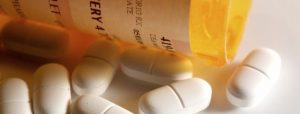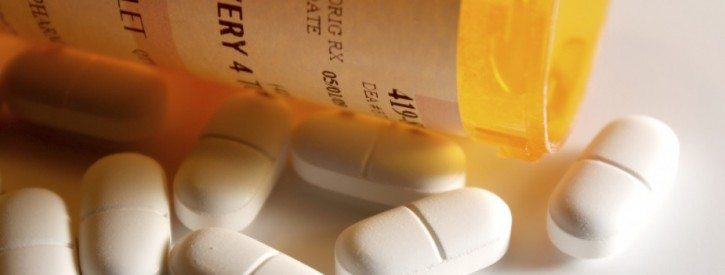 If you have expired or unused prescription medications collecting dust somewhere in your home, National Drug Take-back Day tomorrow is a great opportunity to ditch those nuisance pill containers. On Saturday, April 29, 2017, from 10:00 am-2:00 pm your local time, you can safely dispose of these medicines at a registered site in your community as part of the annual Take-back program. Enter your zip code here to find an authorized drug disposal site near you. All of the medicine will be destroyed at regulated incinerators.
If you have expired or unused prescription medications collecting dust somewhere in your home, National Drug Take-back Day tomorrow is a great opportunity to ditch those nuisance pill containers. On Saturday, April 29, 2017, from 10:00 am-2:00 pm your local time, you can safely dispose of these medicines at a registered site in your community as part of the annual Take-back program. Enter your zip code here to find an authorized drug disposal site near you. All of the medicine will be destroyed at regulated incinerators.
In Baldwin County, the Sheriff’s Department’s main office located in Bay Minette and its satellite office in Fairhope, maintain a 24 hour/7 days a week drop box in the lobby for the disposal of outdated or unused pharmaceuticals. Citizens are encouraged to take advantage of this quick and convenient means of disposing old and outdated medications safely. For security purposes, it is recommended that you remove the labels or scratch out any personal information on the containers before disposing of them. You may also wish to check with a national pharmacy chain located in your area to see if they offer any type of drug disposal program. Learn more.
Many people flush unneeded medicine down the toilet to get them out of the house and out of the reach of children and pets. Although it is convenient to toss medicines in the trash or to flush them down the toilet, these “easy” methods of disposal cause unintended health and environmental hazards. When they are flushed down the toilet or sink, most of these chemicals pass through treatment plants or septic systems and can end up in nearby rivers or lakes. In addition, chemicals from medications that are thrown in the garbage can seep into groundwater at the landfill. As an online article by Sea Grant for Illinois-Indiana explains, “There are three main reasons why the toilet, sink or trashcan should not be the first places you turn when getting rid of your unused medicines.”
 Environmental Impacts
Environmental Impacts
A wide range of pharmaceutical chemicals have been found in rivers, streams, lakes, groundwater, and drinking water nationwide. These include antibiotics, anti-depressants, steroids, seizure medications, cancer treatments, painkillers, tranquilizers and others. Even though the chemicals occur at very low levels (parts per billion or trillion), they are causing changes in behavior, reproduction, and growth in frogs, fish, mussels, and other aquatic animals. Scientists are concerned about aquatic species because they are constantly exposed to the chemicals. But exposure to pharmaceuticals is not limited to only to aquatic species.
Pharmaceuticals have also been found in plants and earthworms exposed to sewage sludge. And in just a decade, millions of vultures in India, Nepal, and Pakistan died of renal failure after consuming carcasses of cattle and water buffalo that had been treated with an anti-inflammatory drug. Researchers are documenting the short-term effects on wildlife, but the long-term impacts of having pharmaceuticals in the environment are not yet known.
Since we get our drinking water from groundwater, rivers, and lakes, people could be impacted too. A 2008 Associated Press investigation found pharmaceuticals in the drinking water supplies of at least 41 million Americans in 24 major metropolitan areas. So far, the thinking is that the concentrations of these chemicals in our drinking water are safe for human consumption. Still, it is worth taking a proactive approach to decrease the amount of unused medicines reaching our water supply.
Accidental Poisoning
Medicines that are stored insecurely in the home, or placed in the trash without taking precautions, are easy for children and pets to get into. Tragically, this can result in unintentional poisonings. Between 2001-2008, over 430,000 children five years or younger were brought to emergency rooms after self-ingesting medicines. And in recent years, human medications have topped the list of pet toxins. Pain-relievers, antidepressants, heart medications, and ADHD medicines all made the list of top 10 medications that poisoned pets.
Drug Abuse and Diversion
Prescription drug abuse is on the rise, particularly among teenagers, many of who mistakenly believe that prescription pills are safer than street drugs. According to the Centers for Disease Control and Prevention, prescription medications, including opioids and antidepressants, are responsible for more overdose deaths than street drugs such as cocaine, heroin, and amphetamines. The Drug Abuse Warning Network reports that emergency department visits involving misuse or abuse of pharmaceuticals increased 98.4 percent between 2004 and 2009, from over 627,000 visits to over 1.2 million. In some cases the drugs being abused were prescribed to the patient, but in many cases they were shared, illegally purchased, or stolen, sometimes from the trash.
If a collection program is not available in your area, use a medicine mail-back envelope that is available at many pharmacies. Otherwise, dispose of the medicine in the trash after following these tips:
- Keep medication in its original container, and do not crush pills.
- Remove or blacken out all personal information, and leave the name and dose of the medication visible.
- Add a safe, unpalatable substance such as kitty litter or used coffee grounds to the medication and then replace the lid.
- Secure the medicine bottle in a leak-proof container, such as a coffee can. Place in the trash as close to your garbage pick-up day as possible.


